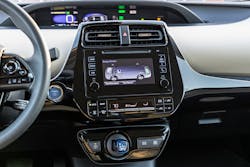Notes from the Editor: Electronics: A Curse And A Blessing
A recent article warned of the possible hazards of driverless vehicles. The article rightfully stated that by removing the human factor, chances of accidents of any kind will be avoided or at least diminished. At the same time, the article states that driverless electronic navigation systems may provide a perfect opportunity for hackers to cause disruptions far worse than what humans can cause manually.
Electronics can be both a curse and a blessing. My personal vehicle has a 500-page instruction manual plus a 100-page quick reference book and it is not a super luxury model. My memories extend back to the days when a dashboard consisted of an ammeter, oil pressure gauge, water temperature gauge and a speedometer. My latest vehicle contains enough buttons on the dashboard and steering wheel, plus a screen of GPS displays which are more reminescent of an airplane cockpit than a normal passenger car.
Similarly, the days when a door was either locked or unlocked have now been replaced by access control systems which can be set to lock or unlock by the time of day, day of week or any preset holiday schedule.
Probably the best indication of where electronics is headed is with automotive security, aftermarket companies are doing a great job in developing tools for programming keys and fobs but the writing is on the wall. Car companies are constantly changing levels of security in an effort to keep us out of the loop and maintain the business for themselves.
As the list of options grow for every different kind of electronic invention, the learning curve for servicing, installing and using these devices also grows. I will never learn what all of the buttons do on my steering wheel and it is dangerous to fumble with them while trying to drive at highway speeds.
This brings us to the bigger picture. The security business is no longer a hand-me-down family affair. There are too many new procedures to learn which were never required in the past. Progressive locksmith businesses are starving for new talent while those of us from the old school have very little electronic background to direct and train newcomers. As a result many good workers are looking elsewhere at the moment: a conundrum which will not quickly be solved.
